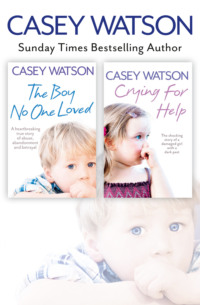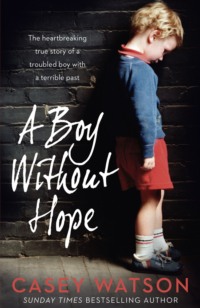
Полная версия
The Girl Without a Voice: The true story of a terrified child whose silence spoke volumes
‘And?’ Mike had asked.
‘And what?’ I’d answered.
‘And how many unmarked £50 notes did you have to slip him?’
No danger of anyone getting a big head in our house.
I had never worried that I might become bored or disillusioned once the reality of working in a large city comprehensive kicked in, but neither had I reckoned on how much the job would consume me. It was just so engrossing – sometimes stressful, sometimes fascinating, but always so interesting – that on weekdays, at any rate, I ate, slept and breathed it.
And it looked like this week would be no exception. A new child always brought a little thrill of excitement, as each one was a different leap into the unknown. And this one sounded particularly intriguing. I made a mental note to see if I could find out anything about selective mutism on my computer once the children were settled with their work.
‘Right,’ I told them. ‘Let’s get this project up in the air, shall we?’
Henry, predictably, groaned at my pun. We had been doing a project on the history of aviation for the past two weeks, and had been devoting the first two hours of each day to developing it. My little group were lucky. Only the school’s IT department enjoyed the luxury of computers, and the only internet connections were on the ones in the school offices. But since my classroom was also my office, that meant I had one of those precious few, so could allow access to the children in my care for their research. And the boys had researched well. And, now, armed with all the information they needed, they had been making a magnificent model of the Wright Brothers’ first plane together with an accompanying narrative.
The girls, meanwhile, had been busy writing a first-person account of Amelia Earhart’s solo flight across the Atlantic. The whole group had also been working on a large timeline poster, complete with carefully cut-out pictures and artwork. They’d all worked hard, and I was proud of them, and would feel even prouder when they presented their work during school assembly the following week.
They worked quietly and productively for a good 20 minutes, when Henry’s hand suddenly shot up. ‘Miss,’ he said, waving it impatiently, as ever. ‘We’ve been wondering – who’s going to do all the talking when we do our presentation?’
Which, when decoded, meant ‘would it be him?’ He was very aware of his status as the oldest in the group, as he would be, given his background.
I walked across and sat down at the boys’ table. I mixed them up sometimes but most of the time the three boys sat at one and the girls at another. It was good to make them work together, obviously, but only up to a point. Most of the time, my number one priority was to have these kids relaxed and receptive – and that meant making them feel as comfortable as possible.
‘Well, that’s for you to decide. All five of you. You’ll have to get together and have a board meeting about it.’
Ben giggled and nudged Henry. ‘Bored meeting, more like. It will be a bored meeting if Molly and Shona have to speak!’
I glanced across at the girls, but they hadn’t even heard. They were, as ever, bent over their work, heads close, engrossed. ‘Don’t be silly, Ben,’ I said. ‘You know I don’t mean that sort of bored. No, you’ll have to have a meeting and discuss it. Though I think it would be nice if you all had something to say, don’t you? You’ve all worked so hard on this that you all deserve the spotlight, don’t you think? Anyway, right now, I need you to all get on, so we can get it finished. And quietly, please, because I need to go and make a phone call.’
I left the kids to it and went across to my desk in the corner, where I buzzed the Learning Support department in search of my sometime assistant, Kelly.
Kelly was a 23-year-old teaching assistant who had a wonderful rapport with the more challenging pupils, which meant she was very sought after within the school.
She answered the phone herself, and pre-empted my question. ‘Hi,’ she said. ‘I know what you’re going to ask and I’ll be down in ten minutes. I saw Mr Brabbiner earlier and he put me in the picture.’
‘Brilliant,’ I said. ‘They’re working on their project right now, too. So you shouldn’t have any problems.’
Kelly laughed. She knew as well as I did that things could change in a split second. One minute everything could be hunky dory – as it was now – and the next all hell could break loose. Still, that was what I liked about her, and what set her apart from some of the other TAs – she seemed to thrive on the unknown element of it all, just as I did, and I’d yet to see her faced with anything she couldn’t handle. She was an expert at thinking on her feet.
I went to sit with the girls for a bit once I’d put down the phone, and had what had become a predictable response from Molly once I’d told them I’d be gone for a bit and that Miss Vickers would be looking after them. She glanced at the boys nervously. ‘You won’t be gone long, will you, Miss? We don’t like it when you leave us, do we, Shona?’
Shona put a protective arm around her friend. ‘Miss Vickers is all right, Molly,’ she reassured her. ‘She won’t stand for any nonsense, will she, Miss?’
‘No, she won’t,’ I agreed, smiling at her grown-up turn of phrase. ‘And there will be no nonsense. Will there, boys?’ I added, raising my voice so they could hear me. ‘Or it’ll be maths practice all afternoon.’
‘Where you going anyway, Miss?’ Shona wanted to know.
‘To a meeting,’ I said. ‘Not a board meeting but a meeting about a new girl who might be joining us. Her name’s Imogen and we need to see if she’s going to be right for us. I’ll be able to tell you more once I’ve been and met her.’
Both Shona and Molly exchanged looks (girls and threes didn’t readily blend well – it took time and management), but it was Gavin who spoke up. ‘Another girl?’ he moaned. ‘We don’t want to be invaded by no more girls, Miss. Is she a retard?’
‘Gavin!’ I admonished. ‘What have I told you about name-calling? Have you remembered nothing of the exercise we did the other week?’
His brow furrowed a little as he tried to recall what I meant. We’d done an exercise I tried to fit into the schedule periodically – splitting the kids into two groups and having each one draw a picture of a gingerbread man. This wasn’t in any sense an art exercise, though. I’d then get one set to annotate theirs with any horrible names they had ever called anyone. And with no holds barred – swear words were acceptable on this occasion, if that had been the way the thing had been said. The other group had to do likewise, only this time they had to record any names they recalled having been called, by either adults or other children. I would then swap the drawings over and ask each group to write down how they would feel or how they felt when they had been called any name from the list, and then compile a separate list of reasons why they thought people might call others by these names.
It was all about developing their emotional literacy; a key part of what my role was in the Unit. And, judging by Gavin’s comment, perhaps I needed to revisit it some time soon.
‘Well?’ I said to him.
‘Sorry, Miss,’ he mumbled. ‘I didn’t mean nothing. Just wanted to know what she would be, like, doing here.’
‘Then you need to think harder about how you’re going to say something before you say it,’ I told him. ‘Because if I hear any more talk like that you will be doing maths practice all afternoon, is that clear?’
I wasn’t too worried about Gavin, however. He’d had his morning dose of Ritalin and it would be another couple of hours before his ADHD became blindingly obvious again. Then it would be another hour before he was given his meds by the school nurse – an hour when it would be hard for me to leave the classroom. Even Henry, who at 13 was two years Gavin’s senior, didn’t like what he called ‘the mad hour’.
I smiled at my trio of lads; they’d actually come on really well in terms of behaviour, even though to the casual observer their improvements might seem tiny. But they were still angry little lads, all three of them like tightly coiled springs, and much as we had calm days, we also had the other kind – days when I seemed to be permanently braced and waiting for the next unexpected explosion. It would be a volatile place for this new girl to try and fit in to, there was no doubt about that.
Kelly arrived bang on cue, clutching two mugs of coffee, one of which I saw was in my superhero mug – it had Batman on one side and Spiderman on the other, and had been a ‘new job’ surprise gift from Kieron. And to date, no one had accidentally walked off with it either; a minor miracle in a school staffroom, apparently. She held it out to me.
‘Here,’ she said. ‘Thought I’d make you one while I was at it.’ Then she smiled at the children. ‘You all look like very busy bees. Everything okay?’
They nodded dutifully. ‘Thanks, love,’ I said to her. ‘That’s thoughtful.’ I had my little ‘coffee corner’ but didn’t always get round to filling the kettle, so the mug of my preferred stimulant was very welcome. ‘I imagine I’ll only be an hour or so, maybe less. But you shouldn’t encounter any problems.’
Kelly grinned, pulling out her walkie-talkie from her pocket. ‘Don’t worry – I’m packing my secret weapon. We’ll be fine.’
Most of the teachers, and some of the support staff, like Kelly, had access to these contraptions so they could call for duty staff to come and help out in an emergency. This might involve something as simple as a child being asked to leave the class due to disruptive behaviour or, in more extreme cases, an extra pair of hands to help break up a physical fight. They were called Computerised Communications Units (CCUs) but I was the resident oddball because I never used mine. I hated new techno gadgets so relied on my new mobile phone – another piece of kit I had yet to fully master.
I grabbed it now and popped it in my handbag. Unlike the majority of the staff, I always kept the latter with me too, partly because with such a small group situation it was easy enough to keep an eye on, and partly because it was akin to a Mary Poppins handbag – something that had developed since Kieron was little. Him being the way he was, it had often been a lifesaver; if he got dirty or cut himself he’d be more upset that he looked dishevelled than if he hurt himself.
It was a lifesaver with the kids in school too. I always had tissues, packs of plasters, biscuits, sweets and even make-up, which always proved popular when girls got upset – a bit of lip gloss and a spot of blusher always cheered them up.
‘Right,’ I said, picking up the bag. ‘I’m off. And remember, everyone, I can whip up a maths lesson in seconds if need be, so, best behaviour while I’m gone.’
I walked quickly through the corridors before the bell went that would signal break time, along with the inevitable stampede of children rushing off to the tuck shop and the playground. It went just as I arrived outside Donald’s office’s closed door.
I opened it to find Donald and the family all assembled, the latter with their backs to me, facing his desk.
‘Ah, Casey,’ said Donald, rising. ‘Come in.’ He pointed to the remaining seat, which was positioned to the side of the desk. ‘This is Mrs Watson,’ he said to the assembled trio as I slipped past them and sat down on it. ‘She’s the one I told you about on the phone, and who’ll hopefully be looking after young Imogen here.’
I smiled and, now that I could see them, took in the row of people. The two grandparents – who were white-haired and both looked to be in their mid-seventies – and Imogen herself, a girl you really couldn’t miss; not with that veil of ginger hair – well, more strawberry blonde, actually; that’s what I’d have called it. But I knew kids. It was red. They’d call it ginger.
‘Good morning,’ I said, extending a hand. ‘Mr and Mrs …’
‘Hinchcliffe,’ the woman provided. ‘I’m Veronica,’ she added, accepting it. Her hand, like the rest of her, was small and frail-looking. ‘And this is Mick. We’re Imogen’s grandparents,’ she added. ‘She lives with us.’
Her voice was clipped and I could see by the way she was holding herself that she was nervous, though her husband – a huge, fit-looking man who had only acknowledged my arrival with a nod – seemed more interested in watching the swarm of excitable children who were now rushing, whooping and shouting, past Donald’s office window. I had the feeling it had been a while since he’d been exposed to so many youngsters all at once.
I turned to Imogen herself, but she didn’t seem to want to make eye contact. She just stared out of the same window, a blank expression on her face.
‘Imogen,’ prompted her grandmother, obviously seeing the direction of my gaze. ‘Did you hear Mr Brabbiner? This is Mrs Watson, your new teacher.’
Now Imogen did turn, blinking once as our eyes met, then lowering her head.
‘She won’t talk,’ Mrs Hinchcliffe said, looking pained. ‘Not here. Not anywhere. Can’t shut her up at home, of course.’
‘Oh, I said, glancing at Don. ‘So she is still speaking sometimes, then?’
Mrs Hinchcliffe nodded. ‘The doctor says it’s something called selective mutism. That she’s just choosing not to talk. Though for the life of us we can’t work out why.’
I nodded. ‘Don’t worry too much,’ I said. ‘I’m sure Imogen will be fine with us, won’t you?’ I turned to Imogen as I said this but she didn’t raise her head. ‘But can I ask you,’ I went on, conscious that I wasn’t completely comfortable discussing Imogen while she was in the room with us, but that, as she didn’t seem to want to contribute, there was really little choice, ‘why this school at this time? Where was she previously?’
Now the grandfather spoke. ‘We took her out of her other high school at the end of the summer term. Had to. She’d been fine before all this started – you know, moving in with us and everything. But when it did start happening, they were useless. All the other kids started picking on her and the teachers were no help at all. Just thought she was being awkward. It’s not right …’
Donald slid a file across the desk to me. ‘These are all Imogen’s notes from her previous school, Mrs Watson. I’ve obviously explained to Mr and Mrs Hinchcliffe that we can take Imogen, no problem, though, in terms of her mutism, I’m not actually sure how much help we can be. Though she does apparently have a therapist working with her at home now, doesn’t she, Mrs Hinchcliffe? So …’
‘A child psychologist, is what it is,’ Mr Hinchcliffe interrupted. ‘Load of mumbo jumbo, if you ask me.’ He scowled, though more in frustration, I thought, than in irritation. ‘The girl needs to sort herself out. Choosing when and where to speak …’
Imogen didn’t react in any way but I could see Don was looking uncomfortable. Perhaps more had been said before I’d entered. There was clearly some tension in the room. ‘Well,’ I said brightly, deciding to take charge of the situation, ‘there’s no need for us to go into all the ins and outs right now, and no point in Imogen being out of school any longer than she has to. If she has some uniform,’ I said, looking at her, but still seeing the top of her head mostly, ‘she could start tomorrow, if you like.’
I looked at Don, who signalled he was fine with that happening. ‘Or,’ I added, as it occurred to me, ‘if she doesn’t, I can perhaps help. We have a good stock of school logo sweatshirts at the moment, so, if you’d like me to find her one, it’s just a case of you kitting her out in a black skirt or trousers and a white shirt.’
Don’s expression changed now, at my off-message largesse. I was actually meant to try and sell the stock of surplus uniform, but I got the impression money was tight and I had a good stock of sweatshirts in my room. I was the lost property queen of the school, after all.
I stood up, picked up the file and extended my hand to the couple once again. ‘So if that’s it for now,’ I said, ‘I really need to get back to my class.’
Everyone else stood up too. ‘No, no, that’s fine,’ agreed Don. ‘We’ll see you tomorrow then, Imogen.’
‘Indeed you will,’ said Mrs Hinchcliffe. ‘Come on sweetheart,’ she said, nudging her granddaughter to stand up as well. ‘Come on, let’s get you home for some lunch, shall we?’
Imogen duly stood and only now could I see just how small she seemed to be for 13: small and slight and dressed in clothes that looked old and, more importantly, old fashioned – nothing like the clothes worn by most of her peer group. She was a pretty girl, with deep blue eyes, pale skin and a liberal sprinkling of freckles. I felt sorry for her. I somehow knew, even without checking, that this was an only child. No older siblings to help with fashion tips and general ‘fitting in’ type guidance. A lonely kid, I guessed, who found it hard to make friends. A ready target for bullies. Definitely that.
It felt all wrong to have been talking over her, even if there wasn’t really an option, since they’d brought her. Which was understandable – they wanted her to see the school for herself, of course they did. But it didn’t really make for a productive meeting. There were so many questions I’d have liked to ask, all of them personal, but that would have to wait till I had a chance to speak to Imogen’s grandparents alone. For now, I had only my gut instinct to rely on, and my gut instinct, as I watched them go, was that there was a lot going on here. That the grandfather’s insistence that they had no idea why their granddaughter had developed selective mutism was – without a doubt – not quite true.
Chapter 3
After a quick lunch and catch-up with Kelly in the staff-room, I made it back to my classroom only seconds before the bell went, with the usual accompanying surge of small purposeful bodies, almost all of whom were ignoring the equally familiar teachers’ shouts of ‘Walk, please!’, ‘Don’t run!’ and ‘Keep left!’
‘Miss, what we doing this afternoon?’ asked Shona, as I flicked on my kettle. ‘Not really maths, is it? Can’t me and Molly do some art?’
I spooned a large teaspoon of coffee into my mug. ‘Not maths, love, don’t worry. And we’re going to do something that is a bit like art, actually. It’s –’
But I was prevented from replying by the arrival of Gavin, bursting through the door like a small-boy-shaped battering ram, his ADHD medication clearly not yet having taken full effect. ‘Whoosh whoosh!’ he yelled, obviously pretending to be an aeroplane, swooping round the tables and catching Molly’s head with a lowered arm as he passed.
‘Gavin!’ Shona barked at him. ‘Leave her alone, you dickhead!’
‘Gavin, sit down,’ I commanded, hoping he’d actually do so. That wasn’t a given – not at this time of day, at any rate. ‘And Shona,’ I added, ‘it’s nice to see you sticking up for Molly, but we don’t name call in this classroom, okay?’
Happily, the other two boys appeared at that moment and, full of the gory details of some fight they had witnessed in the playground, were a timely distraction for the still pumped-up Gavin, so thankfully he did do as he was told. Which was a relief. When he was hyper like this it could sometimes take a good half-hour or more before he calmed down enough to be able to concentrate on anything. Which was bad for everyone else, of course, because his antics were so distracting.
What I had planned for this afternoon, however, might just distract him – and the others, too – in a more constructive way. Having chatted to Kelly, I’d decided to prepare the ground a little in readiness for Imogen’s arrival. I’d therefore changed my scheduled task – which we could do instead once she joined us – for an activity that would celebrate difference.
I had already arranged the tables so they could all sit together, and once my coffee was made, and the tales of ‘near death by the tennis courts’ were out of the boys’ systems, I called the children together and sat them down to explain the task.
‘It’s like art, isn’t it, Miss?’ Molly said. She was clearly proud to be the conveyor of a bit of inside information, bless her, though as soon as all eyes were on her she immediately blushed.
‘It is, love,’ I confirmed. ‘But first I want you all to do some thinking. I want you to think about what it is that makes you different from everyone else.’ I stopped then and dragged my old flip chart closer to the table, folding back the pages to reveal a blank one. I then took my marker pen. ‘Here, see,’ I said, as I began writing words on it. ‘Here are some things that make me me. “Black hair”,’ I said, pointing. ‘“Small”,’ I added, writing it. ‘“Loud” …’
This, predictably, got me a couple of snorts and giggles. ‘All these things,’ I went on, ‘make me different from, say, Molly, who is nice and quiet – when she knows she should be – and has fair hair. Whereas Henry –’ he straightened – ‘Henry has something in common with me. Can you think what that might be?’ I only waited a second before supplying the answer for them: ‘He’s also loud.’
More giggles, and I could see they had begun to work out what I was after. ‘So what I’m going to do,’ I said, ‘is tear off a big sheet of paper for each of you, and you can put things on it that show all your differences. You can use the catalogues and scrap drawers if you want to cut things out and stick them on to brighten things up, but make sure you put your name across the top so we can tell who we’re talking about when we pin them all up.
‘After that,’ I went on, ‘we’ll think of some really famous people, and how they’re different, and some people who might have some kind of disability, and together we’ll do some “difference” charts for them too. And that’s because this week we’re going to celebrate difference in a big way, and what’s more –’ I paused – ‘I have a prize going begging. And it’s going to the person who, by the end of the week, can show the best understanding of it, okay?’
As with any activity that involved cutting, sticking, mess-making and the possibility of a reward at the end of it, my young charges were immediately engaged. They were quick to set about gathering the materials they wanted to use for their creations and by the time I’d worked out the best area of wall to clear for the resultant works of art the room was buzzing with an air of productivity. It also gave me the chance to speak to them one-to-one, as I did every day, as well as their scheduled weekly half-hour life-space interviews. The few minutes in my corner were designed to give them a chance to let me know if there was anything that was troubling them, but today would also provide the perfect opportunity to prepare them individually for the arrival in the morning of our singular new pupil.
The children responded to news of Imogen pretty much as I’d expected. Molly, Shona and Ben all accepted her mutism without question, while Gavin and Henry were instantly curious.
‘Why can’t she speak?’ Henry wanted to know. ‘What happened to her voice? Did she get stabbed in the throat, Miss?’
I rolled my eyes. ‘Of course not, silly,’ I told him. ‘There’s nothing wrong with her throat. It’s just that she can’t speak.’
‘So she must be a baby, then. Either that or a dummy,’ he added disdainfully.
I skewered him on the end of one of my disapproving looks. ‘Henry, what have we been talking about since you came back from lunch? Difference. All the things that make everyone different from everyone else. Your lovely strawberry blond hair, for example. Ben and Gavin don’t have that, do they? And I bet they think your hair is far more interesting than theirs.’
‘No they don’t,’ he huffed. ‘They call me microphone head, Miss. Well, not no more, actually, ’cos I beat them to a pulp.’
I shook my head at the very young teenager sitting before me. The thing you couldn’t miss about Henry travelled everywhere with him – that huge chip that was weighing down his shoulder, as the result of being at the bottom of such a big pile of brothers, and lacking any sort of father figure in his life. That and his hand-me-downs and general struggle to make his voice count at home sometimes made for a very angry young man.








